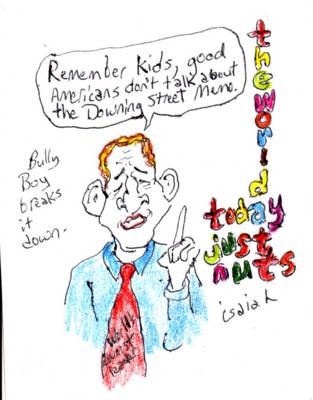The Downing Street Memo was huge news, documenting Tony Blair's rush to illegal war . And, in England, it was generally treated as big news. (One UK outlet which refused to cover the Downing Street Memo was The Guardian newspaper.) In America, not really.

With the exception of the editorial board of The Minneapolis Star-Tribune, no one in the US corporate media appeared to be aware of it for the longest time.
In America?
In America, the Downing Street Memo was initially and largely ignored.
There were exceptions. We certainly covered it here in this community. Probably more than any other person or outlet, David Swanson covered it. But in terms of the press, there were columnists like Molly Ivins and Helen Thomas and reporters like Walter Pincus (Washington Post). Warren P. Stroble and John Walcott (Knight Ridder Newspapers) summarized the memo, "A highly classified British memo, leaked in the midst of Britain's just-concluded election campaign, indicates that President Bush decided to overthrow Iraqi President Saddam Hussein by summer 2002 and was determined to ensure that U.S. intelligence data supported his policy."
While the memo should have been taken seriously, some refused to grasp it.
Today, we're all Michael Kinsley.
No, we haven't been caught nude, outside a hotel room, banging on the door to be let back in.
But we apparently are a nation that chooses to ignore news the way Kinsley did only to then turn catty when he was forced to cover the Downing Street Memo.
Last week, BBC Arabic and The Guardian newspaper teamed up for a documentary (here) and a series of reports (such as here) explaining how the US government sought to put death squads on the streets of Iraq and how, by doing so, they betrayed the Iraqi people and set off a cycle of Iraqi-on-Iraqi violence that has yet to end.
Mona Mahmood, Maggie O'Kane, Chavala Madlena and Teresa Smith (The Guardian) reported:
The allegations made by US and Iraqi witnesses in the Guardian/BBC documentary, implicate US advisers for the first time in the human rights abuses committed by the commandos. It is also the first time that Petraeus – who last November was forced to resign as director of the CIA after a sex scandal – has been linked through an adviser to this abuse.
Coffman reported to Petraeus and described himself in an interview with the US military newspaper Stars and Stripes as Petraeus's "eyes and ears out on the ground" in Iraq.
Sounds like news, doesn't it?
But it's really impossible to find. Shaun Waterman (Washington Times) reported that the Pentagon is examining allegations of abuse. But that's really it for US Big Media coverage of the revelations. Little Media? Saturday, Jeff Keyes (FiredogLake) wrote about it. Not a lot of others.
Surely, the film critics of World Can't Wait made this their big story last week, right?
Wrong.
In fact, Debra Sweet and company couldn't even write one word about it.
Here's a little tip for the chronically stupid: If Bradley Manning is a hero, he's a hero for what he did. The Guardian and BBC report is a result of what Bradley leaked. If you want the world to stand with him, you need to explain what he did and the impact it has had.
Debra Sweet and company are among the many who've had years to find a way to call out counter-insurgency but have refused to do so.
Do your part to tell people about the death squads, about the way the US went after the Iraqi people (the thing that so outraged Bradley) and, in doing so, you'll be able to tell yourself, "Today, they're all Michael Kinsley. But not me, never me."
------------
Illustration is Isaiah's The World Today Just Nuts "Bully Boy Breaks It Down" from June 12, 2005.
